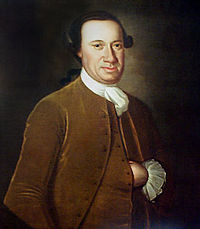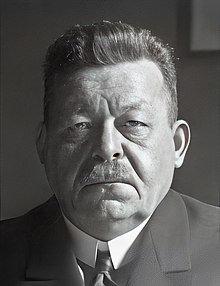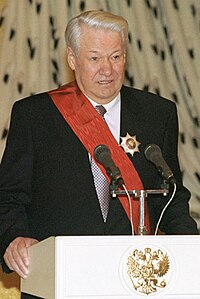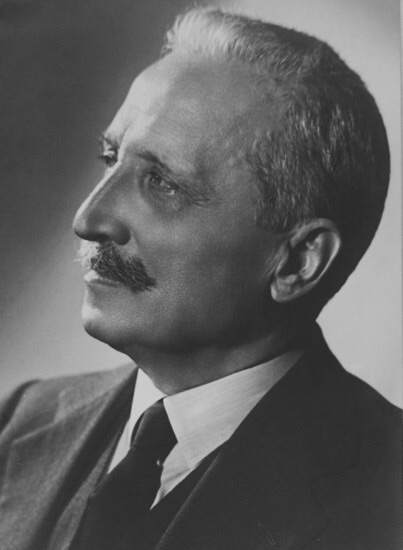1.USA
John Hanson
In November 1781, he was elected President of the Continental Congress, and became the first president to serve a one-year term under the provisions of the Articles of Confederation. While George Washington is recognized by historians as the first President of the United States, having served under the current United States Constitution, some biographies of Hanson have made the unconventional argument that Hanson was the first holder of the office

2.GERMANY
Friedrich Ebert
Friedrich Ebert (4 February 1871 – 28 February 1925) was a German politician of the Social Democratic Party of Germany (SPD) and the first President of Germany from 1919 until his death in office in 1925.Ebert was elected leader of the SPD on the death of August Bebel, and the SPD later became deeply divided because Ebert led it to support war loans for World War I. A moderate social democrat, Ebert was in favour of the Burgfrieden, in which domestic political squabbles were put aside and all forces in society were expected to support the war effort. He tried to isolate those in the party opposed to the war but could not prevent a split.
Ebert was a pivotal figure in the German Revolution of 1918-19. When Germany became a republic, he was its first chancellor. His policies at this time were primarily aimed at restoring peace and order and at containing the more extreme elements of the revolutionary left. For this he allied himself with conservative and nationalistic political forces, in particular with the leadership of the military under General Wilhelm Groener and the right wing Freikorps. With their help, Ebert's government crushed a number of leftist uprisings that were pursuing goals that were similar to those of the SPD. This has made him a controversial historical figure.

3.RUSSIA
Boris Yeltsin
Boris Yeltsin came to power with a wave of high expectations. On June 12, 1991 he was elected president of the Russian Soviet Federative Socialist Republic with 57% of the vote, becoming the first popularly elected president.[1] But Yeltsin never recovered his popularity after a series of economic and political crises in Russia in the 1990s. The Yeltsin era was marked by widespread corruption, economic collapse, and enormous political and social problems.[1] By the time he left office, Yeltsin had an approval rating of two percent by some estimates
4.NIGERIA
Nnamdi Azikiwe
Chief Benjamin Nnamdi Azikiwe, P.C. (16 November 1904 – 11 May 1996),[3] usually referred to as Nnamdi Azikiwe, was one of the leading figures of modern Nigerian nationalism. He was head of state of Nigeria from 1963 to 1966. He served as the second and last Governor-General from 1960 to 1963 and the first President of Nigeria from 1963 to 1966, holding the presidency throughout the Nigerian First Republic.
5.SOUTH AFRICA
JACOB ZUMA
The President of the Republic of South Africa is the head of state and head of government under the Constitution of South Africa. From 1961 to 1994, the head of state was called the State President.The President is elected by the National Assembly, the lower house of Parliament, and is usually the leader of the largest party, which has been the African National Congress since the first non-racial elections were held on 27 April 1994. The role was originally founded to be distinct from the now defunct role of prime minister, but the two roles were merged in the 1983 constitution which specified a four-year term of office. The 1993 and later constitutions limits the president's time in office to two five-year terms.[2] The first President to be elected under the new constitution was Nelson Mandela, and the incumbent president is Jacob Zuma.

6.ITALY
Enrico De Nicola
De Nicola was the first President of Italy. After a popular referendum on the 2nd of June 1946 resulted in the abrogation of the monarchy, the Constituent Assembly elected De Nicola Provisional Head of State on 28 June 1946. On 25 June 1947, De Nicola resigned from the post, citing health reasons, but the Constituent Assembly immediately re-elected him again the following day. After the Italian Constitution took effect, he was formally named the President of the Republic on 1 January 1948. He finally refused to be a candidate for the first constitutional election the following May.
7.KENYA
Jomo Kenyatta
Kenyatta was the leader of Kenya from independence in 1963 to his death in 1978, serving first as Prime Minister (1963–64) and then as President (1964–78). He is considered the founding father of the Kenyan nation.[1]Kenyatta was a well-educated intellectual who authored several books, and is remembered as a Pan-Africanist. He is also the father of Kenya's fourth and current President, Uhuru Kenyatta.
Numerous institutions and locations are named after Kenyatta, including Nairobi's Jomo Kenyatta International Airport, Kenyatta International Conference Centre, Nairobi's main street and main streets in many Kenyan cities and towns, numerous schools, two universities (Kenyatta University and Jomo Kenyatta University of Agriculture and Technology), the country's main referral hospital, markets and housing estates. A statue in Nairobi city centre and monuments all over Kenya stand in his honour. Kenya observed a public holiday every 20 October in his honour until the 2010 constitution abolished Kenyatta Day and replaced it with Mashujaa (Heroes') day. Before the enactment of the new constitution, Kenyatta's face adorned Kenyan currency notes and coins of all denominations (save the 40 shilling coin).

8.CAMEROON
Ahmadou Ahidjo
In 1946, Ahidjo entered territorial politics. From January 28, 1957 to May 10, 1957, Ahidjo served as President of the Legislative Assembly of Cameroon. In the same year he became Deputy Prime Minister in de facto head of state André-Marie Mbida's government. Upon independence in 1960, Ahidjo, as leader of the Cameroon Union, was elected President, and he persuaded part of British Cameroon to join his country. He was reelected in 1965, 1970, 1975 and 1980, gradually establishing the complete dominance of his own party and outlawing all others in 1976.
9.EQUITORIAL GUINEA
Francisco Macías Nguema
Nguema failed the civil service exam three times.[1] However, he eventually rose to the position of mayor of Mongomo under the Spanish colonial government, and later served as a member of the territorial parliament. In 1964, he was named deputy prime minister of the autonomous transition government. He ran for president of the soon-to-be independent country against Prime Minister Bonifacio Ondó Edu on a strongly nationalist platform in 1968. In what has been the only free election held in the country to date, he defeated Ondó Edu in the runoff and was sworn in as president on 12 October. Ondó Edu briefly went into exile in Gabon, and was officially reported to have committed suicide March 5, 1969; alternatively it is reported that Edu was executed soon after his return on trumped-up charges of planning a coup
10.TURKEY
Mustafa Kemal Atatürk
Turkish army officer, revolutionary, and the first President of Turkey. He is credited with being the founder of the Republic of Turkey. His surname, Atatürk (meaning "Father of the Turks"), was granted to him in 1934 and forbidden to any other person by the Turkish parliament.[1]
Atatürk was a military officer during World War I.[2] Following the defeat of the Ottoman Empire in World War I, he led the Turkish National Movement in the Turkish War of Independence. Having established a provisional government in Ankara, he defeated the forces sent by the Allies.
His military campaigns led to victory in the Turkish War of
Independence. Atatürk then embarked upon a program of political,
economic, and cultural reforms, seeking to transform the former Ottoman
Empire into a modern and secular
nation-state. Under his leadership, thousands of new schools were
built, primary education was made free and compulsory, and women were
given equal civil and political rights, while the burden of taxation on
peasants was reduced.[3] His government also carried out an extensive policy of Turkification.[4][5][6][7] The principles of Atatürk's reforms, upon which modern Turkey was established, are referred to as Kemalism.

0 Response to "Meet the first president of popular countries in the world"
Post a Comment
We love to hear from you!
Sign in to comment "anonymously" without entering verification text.
Want to be notified when I reply your comment? Tick the "Notify Me" box.